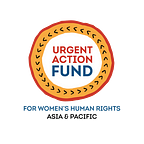The Ocean and its Rhythms
Love, Care, and Rebellion
UAF A&P’s outgoing Board Chair, Kamala Chandrakirana, reflects on her time with us and shares her parting vision for the organisation and the human rights defender ecosystem.
Firstly, thank you to the UAF A&P team for giving me space to make a written sign-off as I end my term as member and chair of the Regional Board. I leave with confidence that UAF A&P’s new and continuing Board members will provide strong leadership and meaningful support for the Co-Leads as the organization charts its course for the years to come.
It has been an engrossing journey that began a few years before this regional feminist fund was established. I was among the midwives within the board of UAF in the USA that facilitated the birth of this sister fund. Allow me to take this opportunity as a way to make sense of our work so far and to share some reflections for the way forward.
Defenders of human rights in Asia and the Pacific rely on the movements of which they are part for support and protection in the face of gross human rights violations and unending political, economic, social and ecological crises.
We do not have the advantage of defenders in other regions of the world, which is access to a regional human rights mechanism that binds its member states to comply with their human rights obligations. If the definition of impunity is the impossibility of bringing perpetrators of human rights violations to account, then this is the stark reality for defenders in Asia and the Pacific who are dependent on flawed national mechanisms and on a far-away international human rights mechanism based in the other side of the globe. No wonder many violations, conflicts, crises go unresolved and unaccounted for over long stretches of time. This reality takes a specific toll on human rights defenders.
Our geopolitical terrain became even more complex over this past decade, with growing authoritarianism, towering oligarchs, and the spectre of war involving the world’s political and economic giants.
It has been a personal privilege for me to be part of building a regional system of support and protection for women and non-binary human rights defenders in Asia and the Pacific. From the beginning it was very clear to us founders that UAF A&P needed to be solidly grounded in our movements and that, given the challenges of our time, our role had to be both responsive and visionary. Responsive in terms of being timely in meeting the needs of defenders at risk, and visionary in terms of providing space to co-create pathways for long-term resilience as integral to the survival and thriving of our movements.
Being a feminist fund in a part of the world where such a thing is rare, we understood the push to break new ground in order to obtain and grow resources from within Asia and the Pacific.
As we continued to be beneficiaries of crucial support from global sources, we also began exploring a framework that could speak to those who want to build our economic system anew based on solidarity and mutual care in our corner of the world. Conventional donors and donations would continue to be necessary for UAF A&P’s sustainability, but we also want to be part of a larger and visionary goal that aims at creating a different socioeconomic world for the future. The hope is to find new partners for resource mobilization within our regions among an emerging community of bold visionaries.
As my time in the UAF A&P Board was reaching its end, I reflected on the role of narrative — not just responsive grants — as a means of support and protection for women and non-binary defenders.
Could the right narrative have protective impact for defenders at risk particularly in contexts where no effective law exists for their protection?
Imagine public narratives that give recognition and legitimacy to defenders’ stories and that generate a sense of common mission to support them in their struggles. Imagine a public body of knowledge that builds a shared understanding of the risks and challenges faced by defenders in their diversity and across multiple contexts. Imagine creating public spaces that celebrate and regenerate the collective energy inspired by Asia and the Pacific’s women and non-binary defenders. For such narratives to be able to speak to the public, there is the question of language. In our part of the world, where cultural references and symbols are vibrant and abundant, could we redefine and remake them to help us communicate our message? Maybe this could be called ‘cultural advocacy’. How would cultural advocacy complement political and legal advocacy for the support and protection of women and non-binary defenders at risk?
As a young feminist fund born out of a two-decade legacy of the UAF Sister Funds, UAF A&P has spent its early years establishing its place among the ecosystem of social movements defending human rights in Asia and the Pacific. In so doing, it has also made its unique mark within the global sisterhood of UAFs. It still has much room to grow. What a gift it has been for me to be able to see how far our team has come in making the fund relevant in such a challenging historical moment. I would like to close by expressing my deep gratitude for those who have shared the journey with me, through all its highs and lows, struggling to stay true to our purpose and values with boldness and creativity. May the path forward be as meaningful and enriching.
Kamala (or Nana) Chandrakirana is a feminist human rights activist from Indonesia. Her parting note and vision for UAF A&P, ‘The Ocean and its Rhythms,’ is an excerpt from ‘Stirrings of the Earth’.
